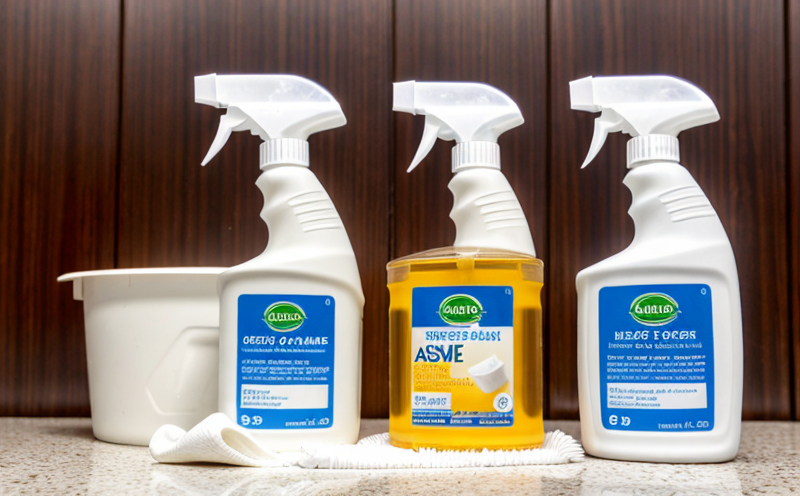GB T 36758 Virucidal Testing of Hygiene Products
The GB/T 36758 standard provides a comprehensive framework for evaluating the virucidal efficacy of hygiene products. This method is crucial in ensuring that cleaning and hygiene products effectively eliminate or reduce viral pathogens, thereby protecting public health. The testing protocol involves exposing the product to specific strains of viruses under controlled conditions, followed by assessment of residual viability.
The process begins with selecting appropriate test samples that represent real-world usage scenarios. Specimen preparation is critical; this may involve dilution if necessary to achieve concentrations consistent with actual application rates. Once prepared, the specimens are exposed to known quantities of target viruses, typically using standardized inoculation methods. After exposure, samples undergo incubation periods designed to allow viral replication or survival.
Following incubation, testing for residual virus involves various techniques such as plaque assays, cell culture, or RT-qPCR (real-time quantitative polymerase chain reaction). These methods enable accurate quantification of viable viruses present in the tested products. Acceptance criteria vary based on intended use; generally, a reduction factor greater than 99% is considered effective.
Compliance with GB/T 36758 ensures not only regulatory adherence but also enhances brand reputation by demonstrating commitment to product safety and efficacy. It supports informed decision-making for quality managers, compliance officers, R&D engineers, and procurement teams involved in developing and validating hygiene products.
- Customer Impact: Compliance with GB/T 36758 ensures that customers receive high-quality, effective products designed to protect against viral transmission. This builds trust among consumers who value cleanliness and safety.
- Safety Assurance: By meeting this standard, manufacturers can guarantee their products' effectiveness in reducing the spread of infectious diseases.
- Market Competitiveness: Adhering to international standards like GB/T 36758 enhances a company's market position by offering superior product quality compared to non-compliant alternatives.
In summary, adhering to GB/T 36758 is essential for manufacturers seeking to produce reliable and effective virucidal hygiene products. This standard plays a pivotal role in safeguarding public health while promoting industry best practices.
Why It Matters
The importance of virucidal testing cannot be overstated, especially given the increasing prevalence of infectious diseases worldwide. Hygiene products play a crucial role in preventing the spread of pathogens through regular cleaning and disinfection practices. Ensuring these products meet stringent standards like GB/T 36758 is vital for several reasons:
- Health Protection: Effective virucidal performance helps prevent the transmission of infectious diseases, particularly in high-risk environments such as hospitals, schools, and public spaces.
- Patient Safety: In healthcare settings, virucidal hygiene products are critical for reducing nosocomial infections. Compliance with GB/T 36758 ensures that these products can reliably eliminate pathogens associated with outbreaks or endemic conditions.
- Consumer Confidence: Consumers expect effective and safe cleaning solutions when using hygiene products. Meeting international standards builds trust and loyalty among customers.
In essence, virucidal testing is not just a regulatory requirement but also a commitment to public health and safety. It reflects an ongoing effort by manufacturers to provide products that meet or exceed industry expectations.
Applied Standards
The GB/T 36758 standard is one of several international guidelines used in virucidal testing, each providing unique insights and requirements. Here are some key standards:
- ISO 14978: This document provides general principles for the application of risk management to medical devices, including considerations relevant to antiviral efficacy.
- ASTM E2653: Focuses on the use of plaque assays for evaluating disinfectants and sanitizers against specific viruses.
- EN 14995: Covers the requirements for antimicrobial activity of hand hygiene products, including criteria for virucidal testing.
While GB/T 36758 specifically addresses the Chinese market's needs, it aligns closely with these international standards. By incorporating elements from multiple sources, this standard ensures broad applicability and robustness across different regions and industries.
The harmonization of global standards like GB/T 36758 contributes significantly to consistency in product performance evaluation worldwide. This alignment supports cross-border trade and collaboration among manufacturers and regulatory bodies.
Customer Impact and Satisfaction
The implementation of GB/T 36758 has a direct impact on customer satisfaction by enhancing the perceived quality and effectiveness of hygiene products. Here are some ways this standard improves user experience:
- Enhanced Safety: Customers benefit from safer environments, reducing risks associated with viral infections.
- Ethical Branding: Brands that comply with GB/T 36758 enhance their reputation as responsible and trustworthy providers of healthcare products.
- Competitive Advantage: Meeting this standard differentiates brands in competitive markets, attracting health-conscious consumers.
A satisfied customer base translates into higher sales volumes and repeat purchases. This positive feedback loop strengthens brand loyalty and fosters long-term relationships between manufacturers and their customers.





